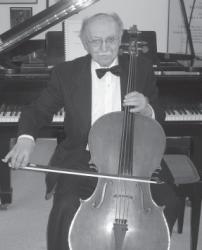Farago, Marcel
Biography
Born: 1924
Country: Timisoara, Rumania
Studies: Bucharest Royal Academy
Teachers:
Online Article
Marcel Farago’s 90th birthday party on Apr. 17 will be celebration of music and life. The retired cellist and composer who spent four decades playing for the Philadelphia Orchestra will be feted by fellow musicians performing his original works in the Uxbridge Community Center in Cherry Hill.
For Farago, who was born into a family of musicians and has played to audiences worldwide, the marking of this milestone birthday is fitting. His works have been performed by the Philadelphia Orchestra, the Gyor Philharmonic Orchestra in Hungary, numerous soloists, as well as other orchestras in the United States and overseas. To ensure that the compositions will be enjoyed for years to come, the Romanian-born musician now devotes much time to updating, printing and preserving his manuscripts.
“I’m enjoying my retirement, friendships and the nice, quiet life,” said Farago, who last played in public at the Kol Nidre service at Temple Emanuel about 10 years ago.
He has outlived most of his family, including his first wife Ady, who died of a heart attack in 1998, and his second wife, Lily, who died from cancer-related illnesses in 2000. He also outlived his two brothers, who also immigrated to the United States and pursued music-related careers.
Although he no longer plays the cello due to health issues, his mind stays active. Adding to the 10 languages he can speak, Farago is currently studying Modern Greek.
Since birth, music has taken center stage. The middle of three boys born to professional musicians, Farago took up the violin at the tender age of four, adding the piano a few years later. When he hit double digits, Farago’s father decided to form a string quartet with his three boys. The only issue was that no one played the cello until, one day, his father bought one and found a teacher.
“He told me to start playing, I did and I fell in love with it,” Farago recalled.
He has fond memories of the quartet, which played Hebrew melodies in concerts in his hometown. Farago even composed some of his first pieces, which the family quartet played to audiences. But World War II disrupted the tranquility of life. Although most of his family was allowed to stay put, Romanian antisemitic laws required that all Jewish men over 18 be sent to labor camps. He and his older brother were taken away, forced to work in fields and build roads in mountains, among other physical jobs.
After the war, Farago returned home and studied for a year in Bucharest. The talented musician then continued studying music in Budapest, Italy and France. Although he tried to pursue his career in France, as a foreigner he found it hard to find jobs. His break came in 1952 when he was offered a position with the Cape Philharmonic Orchestra in Cape Town, South Africa. Then, the opportunity to be principal cellist for the Brazil Symphony Orchestra in 1954 brought him to South America.
In 1955, he landed his dream job as cellist for the Philadelphia Orchestra. During his long career, he played under the leadership of Eugene Ormandy, Riccardo Muti and Wolfgang Sawallisch. Meanwhile, his original compositions were finding an audience.
Steve Schaffner, owner of Schaffner Publishing Company in Merchantville, has known Farago for more than a decade, since he started editing and publishing the retired musician’s compositions. The reason Farago is not more of a household name is that his music is in competition with the better-known classical composers, including Mozart and Beethoven, Schaffner explained.
“It’s the same as rock music,” Schaffner said. “Audiences want to hear old favorites. It’s very, very difficult for a contemporary composer to make a name for himself.”
“Marcel’s work is very good,” he added. “It’s modern but not unpleasant to the ears. It’s very melodic.” .[1]
Works for Percussion
Rhythm and Colors, op.19A - Percussion Sextet
References
